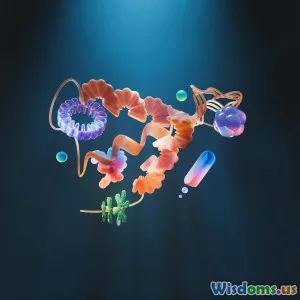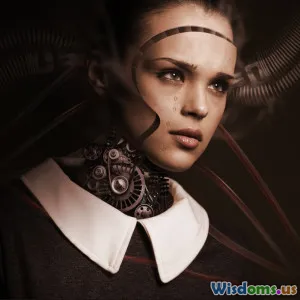
The Connection Between Astrology and Psychology
8 min read Discover how astrology and psychology intertwine, offering unique insights into human behavior and our deeper selves. (0 Reviews)
The Connection Between Astrology and Psychology
Astrology, often branded a pseudoscience, and psychology, a rigorous modern science, seem worlds apart. But what if these two seemingly disparate disciplines share a deeper connection? For thousands of years, humans have looked skyward, reading celestial movements for clues about personality, fate, and the human psyche. Meanwhile, psychology has endeavored to understand the mind through empirical studies and clinical practice. This article explores the dynamic interplay between astrology and psychology, showing how the ancient language of stars complements the modern quest to decode human behavior.
Ancient Origins: Astrology and Early Psychological Thought
Astrology’s roots date back millennia, with civilizations like the Babylonians and Greeks developing intricate systems to interpret the cosmos’ influence on earthly existence. More than fortune telling, astrology historically served as an early attempt to explain human nature and destiny—tasks that psychology now strives to fulfill scientifically.
Notable thinkers from the Middle Ages to the Renaissance often combined astrology with philosophical musings about the human mind. For example, the concept of the four humors in medicine, linked to bodily fluids influencing temperament, bears resemblance in framework to astrology’s zodiac signs governing personality traits. The star chart could be read as a symbolic map of one’s inner tendencies, an early compass for character analysis.
Psychological Archetypes in Astrology: Carl Jung’s Contribution
One of the most influential figures connecting astrology and psychology was Carl Gustav Jung, a pioneer of analytical psychology. Jung believed in the collective unconscious—a shared realm of primordial symbols and archetypes that manifest in myths, dreams, and cultural rituals.
For Jung, astrological symbols represented powerful archetypes expressing universal human experiences. For example:
- The Sun: Symbolizes ego, identity, and conscious purpose.
- The Moon: Reflects emotions, instincts, and the subconscious.
- Mercury: Represents communication and intellect.
By interpreting astrology through archetypes, Jung viewed the zodiac as a symbolic framework to understand personality and psychological conflicts. His concept of synchronicity—the meaningful coincidence of events—further legitimized considering celestial patterns as reflective rather than causal of inner states.
Astrology’s Role in Personality Typologies
Modern psychology uses various models to categorize personality, such as the Big Five traits or Myers–Briggs Type Indicator (MBTI). Interestingly, astrology too offers a classification system through zodiac signs and planetary rulers.
Studies reveal intriguing parallels:
- Fire signs (Aries, Leo, Sagittarius) often correlate with extroversion and enthusiasm.
- Earth signs (Taurus, Virgo, Capricorn) are aligned with conscientiousness and stability.
- Air signs (Gemini, Libra, Aquarius) emphasize intellectual curiosity and sociability.
- Water signs (Cancer, Scorpio, Pisces) resonate with emotional sensitivity and intuition.
Though astrology lacks the empirical rigor of psychology, these patterns echo communal observations about personality traits. Some psychologists and counselors integrate astrology as a complementary tool for self-reflection, helping clients frame their psychological strengths and challenges within a symbolic context.
Astrology in Therapeutic Practices: Beyond Skepticism
Therapists increasingly explore holistic methods to enhance client insight and healing, incorporating modalities outside conventional psychology. Astrology can function as a narrative device, facilitating patient engagement and personal meaning-making.
For instance, the placement of Venus in a natal chart could be examined to discuss relationship patterns, or Saturn’s position used metaphorically for boundaries and discipline. Such symbolic interpretations invite clients to explore deeper emotions and unconscious drives in a structured format.
Notably, the use of astrology in therapy should not substitute evidence-based treatment but serve as an adjunct promoting self-awareness and empowerment.
Scientific Critiques and Limitations
Despite its allure, astrology faces significant criticism from the scientific community. Major points include:
- Lack of empirical evidence: Extensive studies (such as Shawn Carlson’s double-blind test published in "Nature" 1985) found no consistent correlation between astrological charts and personality measures.
- Barnum Effect: Generalized statements in horoscopes appeal broadly, making people believe descriptions are uniquely accurate.
- Causal ambiguity: Astrology posits correlations without clear causal mechanisms; what influence stars hold on human psychology remains unproven.
These limitations mean astrology should be engaged with critically and understood primarily as a symbolic system rather than a scientific fact.
Bridging the Gap: The Modern Quest for Meaning
In today’s fast-paced world, astrology and psychology both satisfy deep human needs—to understand oneself and find meaning beyond the tangible. Psychotherapy often benefits from metaphor, art, and narrative; astrology provides a rich symbolic lexicon to enrich that process.
Moreover, digital astrology apps and psychological self-assessments coexist as popular tools for introspection, blending ancient and modern methodologies. Individuals report feeling empowered by relating their behaviors to cosmic themes or psychological diagrams, fostering holistic self-growth.
Conclusion: An Intersection of Mysticism and Science
The relationship between astrology and psychology embodies an intriguing blend of mystery and rigor. While astrology lacks empirical validation by modern science, its archetypal language offers a meaningful lens to examine personality and the human condition. Psychology’s evidence-based methods deepen our understanding of the mind, but the symbolic richness of astrology continues to captivate seekers of self-knowledge.
Rather than dismissing astrology outright, appreciating it as a metaphorical system enhances psychological insight, creativity, and cultural awareness. As Jung famously said, “Who looks outside, dreams; who looks inside, awakes.” Astrology invites us to look both outward to the stars and inward to the psyche—a timeless dance between cosmos and consciousness.
References
- Carlson, Shawn. "A double-blind test of astrology." Nature, 318, 1985.
- Jung, Carl Gustav. Man and His Symbols, 1964.
- Sakoian, Frances, and Louis Acker. The Astrology of Personality, 1973.
- Pew Research Center. "Public views on Astrology," 2020.
Rate the Post
User Reviews
Popular Posts





















